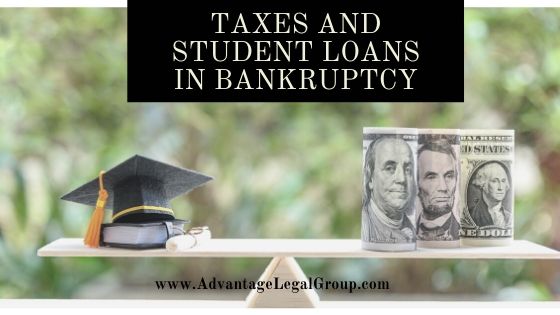Taxes and Student Loans in Bankruptcy
There are certain kinds of debt that can be discharged in bankruptcy.
A Chapter 7 bankruptcy is a great way to reduce or eliminate many debts. A Chapter 7 bankruptcy can help discharge credit card debts, medical debts and many other types of unsecured debt. A Chapter 7 bankruptcy may allow you to reduce or eliminate credit card debts or other unsecured debts, thereby enabling you to focus your debt repayment efforts on tax liabilities and student loans.
Taxes and Student Loans – Dealing With Non-dischargeable Debts in Bankruptcy
Some debts are difficult or impossible to discharge through bankruptcy. Debts that are difficult or impossible to discharge include:
- Student loans
- Child support arrears
- Certain types of taxes owed to the government
Not all unsecured debts can be eliminated in bankruptcy. While exceptions to discharge cover debts range from child support to back taxes, rules differ depending on factors like the nature of the debt, the age of the debt, or your ability to present a hardship case.
Non-dischargeable debts come in many forms. Some are by definition non-dischargeable, while others are subject to discharge unless the creditor files a specific objection. Examples of non-dischargeable debts include the following:
- Lawsuit damages related to drunk driving, willful or malicious conduct, or fraud
- Child support or alimony
- Taxes that are less than three years old or for which no return has been filed
- Most student loan obligations
- Certain credit card debts incurred under circumstances indicating an intent to defraud the issuer
Certain types of state and federal taxes, as well as student loans, fall into the category of debts that are generally not dischargeable. However, some types of tax obligations can be discharged. Talking to a lawyer can help you to determine which type you have.
There are also debt relief services available to people suffering from an unmanageable tax debt or student loan debt. For example, a Chapter 13 bankruptcy may allow you to pay back other debts over a longer period of time and therefore increase your ability to handle your current tax or student loan debt load.
Many old tax debts can be discharged in bankruptcy
Many people will tell you that tax obligations are non-dischargeable debts. This is only true of taxes that have been assessed and payable for less than three years.
If you owe taxes for which you’ve filed the returns more than three years ago, or that have been in collection for at least that long, you can discharge them in bankruptcy like other unsecured claims unless enforceable tax liens are in place against property with enough value to meet them.
Student Loan obligations in bankruptcy
It used to be that a hardship argument could convince a bankruptcy court to excuse you from repayment of student loans.
Today, recent amendments to the Bankruptcy Code have made it more difficult to prove hardship as a basis of discharge. In order to prove hardship, it is now necessary to demonstrate that your education has little or no value in helping you generate income for reasons beyond your control. It is also important to note that if you have been excused from your student loans there are many jobs that you will be unable to apply for because you have been excused from repayment of student loans.
Find Out if You Qualify
